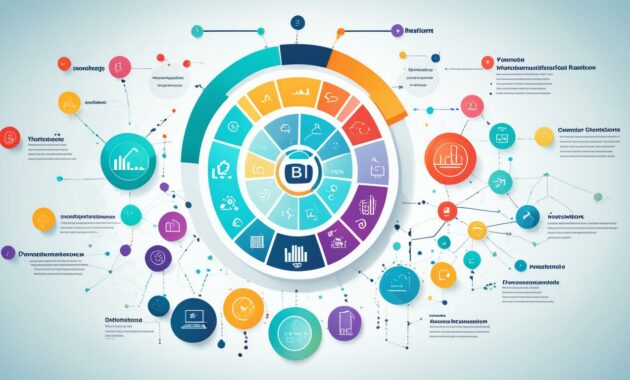Welcome to the world where data guides our choices. In our fast world, using data to make decisions is key. Business intelligence tools help you find important insights in your data. They let you make smart decisions for your business.
These tools give you a competitive advantage and help you meet your goals. They sort and visualize complex data. This gives you the insights to better your operations, enhance customer experience, and grow your business.
This article will cover what business intelligence tools are, their main features, and their benefits. We’ll help you pick the right tools and discuss how to use them effectively. You’ll also see real-life examples of how they change industries.
No matter if you’re a small startup or a big company, these tools offer the insights you need. Let’s see how they can change your decision-making and push your business to success.
What are Business Intelligence Tools?
Business intelligence tools are essential in our data-focused world. They help companies gather, analyze, and make sense of a lot of data. This helps them make better choices.
With these tools, you can discover important details in your data. This helps you see trends, find chances, and tackle problems. These tools make it easier to deal with complex data, so you can make smart decisions confidently.
Primary Functionalities and Capabilities
Business intelligence tools offer many functions that let companies use their data well. They can:
- Bring data from different sources together in one place
- Show data updates in real-time through visuals and reports
- Allow instant data analysis and questions
- Help predict future trends and insights
- Make it easier to explore and understand data
- Automate the cleaning and combining of data
- Let all users analyze data, no matter their tech skills
Utilizing these features, business intelligence tools reveal hidden insights in your data. This helps you make choices based on facts, leading to success in business.
Key Features of Business Intelligence Tools
Business intelligence tools have many important features. They let companies get valuable insights from their data. This helps you make choices based on data, grow your business, and stand out in the market.
Data Visualization
Data visualization turns complex data into easy-to-understand visuals. Charts, graphs, and dashboards show trends and patterns. This makes it easier to make good decisions.
Real-Time Reporting
Real-time reporting is a key feature too. It lets you get the latest info and make reports right away. You don’t have to collect data by hand, which saves time. This means you always have fresh insights for making choices.
Predictive Analytics
Predictive analytics is built into business intelligence tools. It uses past data and math to guess what might happen next. This lets you see trends, risks, and chances early. And lets you make smart decisions ahead of time.
Interactive Dashboards
Interactive dashboards are easy-to-use tools that let you work with data in real-time. They let you look at data, sort info, go into details, and change views as you like. These dashboards help you dig deeper into data for better insights.
These features are just a start of what business intelligence tools offer. They turn raw data into useful info. You get a full view of how your business is doing. And you can make smart decisions based on data.
Benefits of Using Business Intelligence Tools
Using business intelligence tools can bring many advantages. They help you make smart choices, improve operations, and beat the competition.
Improved Decision-Making
Business intelligence tools help you understand your data better. This means you can make smarter, well-informed choices. You gain insights through real-time reports and data visuals.
This lets you spot trends and predict customer needs. So, you can adjust your plans to fit.
Cost Reduction
These tools help you cut costs by making operations smoother. They analyze spending, resources, and how well things are done. This way, you find and fix wasteful practices.
Enhanced Operational Efficiency
With business intelligence tools, tasks like analyzing data become automatic. This saves effort and time. You get up-to-the-minute data and can watch important measures closely.
You can track goals and fix problems early. This boosts your operations.
Competitive Advantage
Business intelligence tools give you an edge over others. They reveal hidden insights and spot new market trends. You can react swiftly, take new chances, and stay in front.
In the end, adding business intelligence tools to your toolkit has big benefits. These include better decisions, lower costs, more efficient operations, and staying competitive. Through these tools, your business can reach its highest potential and lead success.
Choosing the Right Business Intelligence Tools for Your Organization
Finding the right business intelligence tools is crucial for making smart decisions based on data. With so many options out there, picking the best one for your organization might feel overwhelming. Yet, by taking a step-by-step approach and focusing on important aspects, you can pick wisely. This ensures your choice meets your business objectives and needs.
- Evaluate your organizational needs: Start by figuring out what you need from business intelligence. Think about the data you work with, how detailed your analysis needs to be, and if you need to scale up. Knowing what you need helps you spot the right features in a tool.
- Consider your budget: Prices for business intelligence tools differ a lot. It’s key to know your budget to limit your search. Remember, it’s not just about the cost. The tool’s value and what it brings to your business matter more.
- Assess user-friendliness: For your business intelligence effort to work, everyone must use the tools. Look for tools that are easy to use. This encourages everyone to get involved and makes the tools more effective.
- Examine integration capabilities: It’s vital that the tools work well with your current systems and data. Choose tools that can easily link up with your data sources. This makes getting insights quicker and simpler.
- Research vendors and read reviews: Do your homework on the companies offering business intelligence tools, their market status, and what users say about them. This helps you understand how dependable the tools are, the level of support offered, and if users are happy.

To pick the best business intelligence tools for your team, just follow these steps. The right tools should not only fit your current needs but also grow with you. With the perfect tools, you can truly benefit from your data. This leads to making better decisions that push your business ahead.
Integration and Implementation of Business Intelligence Tools
After picking the perfect business intelligence tools for your team, the next big move is to integrate and implement them well. This step is key for making the most of what these tools offer.
By linking your business intelligence tools with your data sources, you create a unified data view. This lets you see and analyze information from many places all at once. It gives you deep insights and supports smart decisions.
When implementing, check if your business intelligence tools fit well with your existing IT systems. Understanding and tackling possible tech issues early makes for smoother integration.
Best Practices for Integration and Implementation
- Define clear goals and objectives: Spell out your goals for using these tools. It helps to match your strategy with your business plans.
- Involve all stakeholders: Get input from people across your organization. This makes sure all views are considered, improving adoption of the tools.
- Plan and prioritize: Make a detailed plan with steps, times, and needed resources. Focus on the most important parts first for a smooth start.
- Ensure data quality and security: Put in place checks and safety measures to protect sensitive info and keep data accurate during the integration.
- Train and educate users: Offer detailed training and support to those using the business intelligence tools. This helps them use the tools well for better decisions.
To streamline the integration and implementation of your business intelligence tools, follow these practices. Doing so will ensure they work well with your systems, leading to success.
The Integration and implementation of business intelligence tools are critical for leveraging your data fully. By integrating these tools smoothly, you unlock insights that can guide strategic decisions.
Case Studies: How Businesses Have Leveraged Business Intelligence Tools
Business intelligence tools are very useful. They help businesses grow, improve customer service, and meet their goals. By looking at real examples, we see how different companies got ahead. They made smart, data-driven choices.
Acme Corporation changed how they work with these tools. They’re a big, global company. They made their supply chain better by analyzing data in real time. This let them find problems, manage stock better, cut costs, and work more efficiently. With better information, Acme made smart choices. This increased their profits a lot.
XYZ Retail is another great example. They’re doing well online. They used these tools to understand what their customers like and do. By looking at customer data, they could target their marketing better. This improved how customers saw them. Sales went up, and customers stayed loyal.

Acme Corporation and XYZ Retail show how powerful these tools can be. No matter the size or field of a business, these tools can offer key insights. They help companies grow and beat competitors.
These success stories are very inspiring. By looking at them, businesses can find useful tips. Adapting these strategies to fit their own needs can lead to big wins.
Conclusion
In the world of business today, using top business intelligence tools is key. These tools help you find key insights to push your company forward. They change raw data into useful information, helping you make smart choices and beat the competition.
Business intelligence tools let you understand your data better. You can spot trends and hidden patterns. This knowledge helps improve operations, make processes smoother, and boost profits.
These tools give you access to real-time reports and visualizations. It becomes easier to share insights with your team. This boosts team work and promotes data-driven decisions.
So, no matter the size of your business, investing in business intelligence tools is wise. They can transform how you use your data. Start using these tools, find important insights, and help your business grow.



